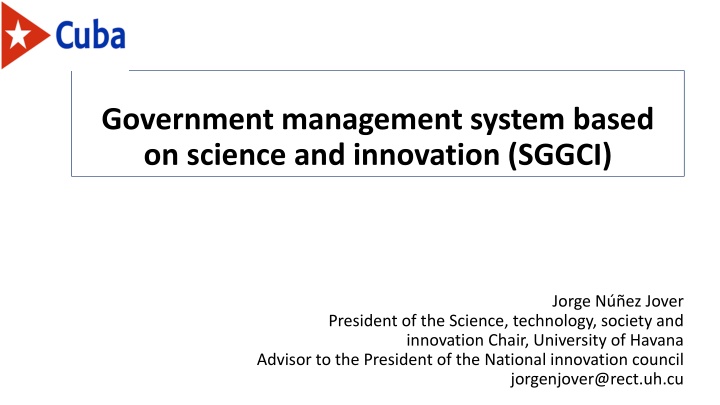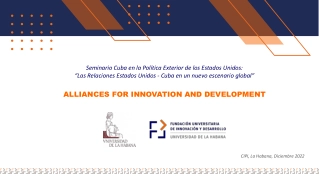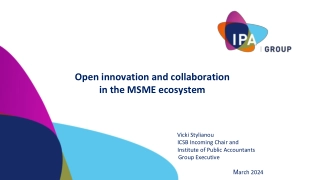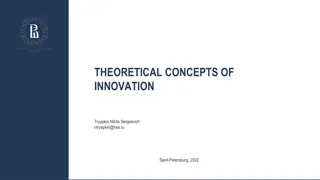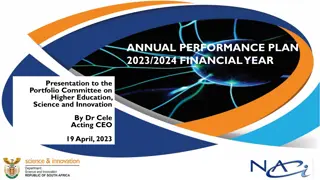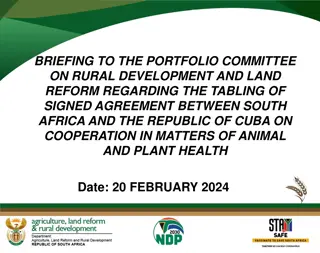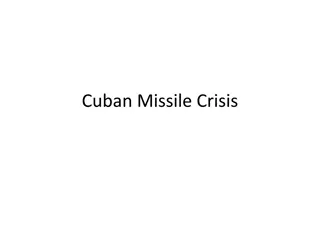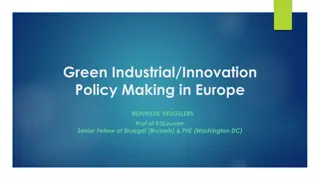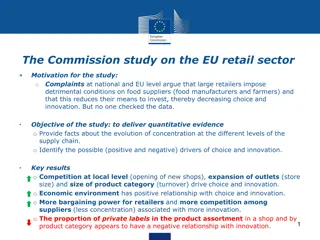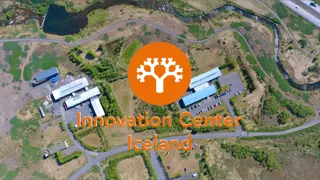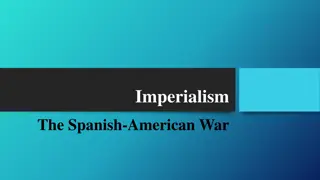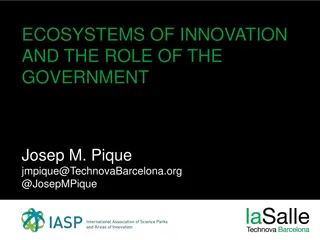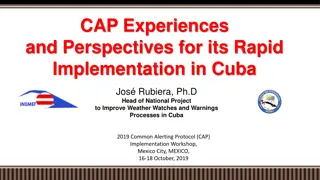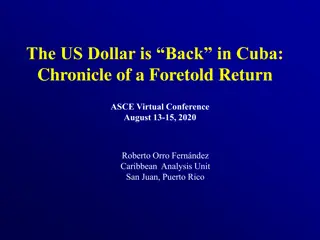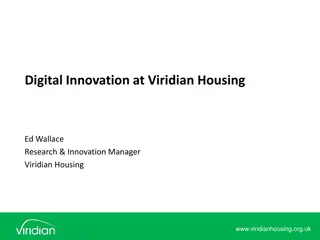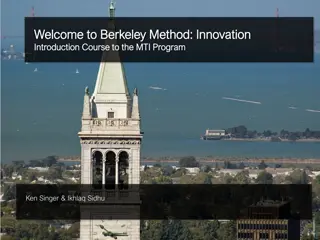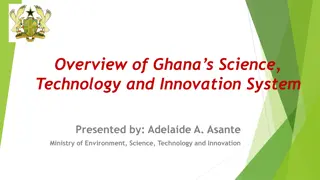Government Management System Based on Science and Innovation in Cuba
The Cuban Revolution under Fidel Castro emphasized the role of knowledge, science, and technology in national development. With the Constitution of the Republic in 2019, science, technology, and innovation (STI) are recognized as crucial for prosperity, sovereignty, and independence. Amid the COVID-19 pandemic, the Government management system based on science and innovation (SGGCI) in Cuba strengthened collaboration between the government, public health sector, biotechnology industry, universities, and research institutions to combat the crisis effectively. This system facilitated a productive science-government dialogue, promoted intersectoral connections, and prioritized agile decision-making and resource allocation. The goal is to enhance the nation's development through science and technological autonomy.
Download Presentation

Please find below an Image/Link to download the presentation.
The content on the website is provided AS IS for your information and personal use only. It may not be sold, licensed, or shared on other websites without obtaining consent from the author.If you encounter any issues during the download, it is possible that the publisher has removed the file from their server.
You are allowed to download the files provided on this website for personal or commercial use, subject to the condition that they are used lawfully. All files are the property of their respective owners.
The content on the website is provided AS IS for your information and personal use only. It may not be sold, licensed, or shared on other websites without obtaining consent from the author.
E N D
Presentation Transcript
Government management system based on science and innovation (SGGCI) Jorge N ez Jover President of the Science, technology, society and innovation Chair, University of Havana Advisor to the President of the National innovation council jorgenjover@rect.uh.cu
Some Some background background (1) (1) 1. A characteristic of the Cuban Revolution has been the emphasis on the role of knowledge, science and technology in national development. Fidel Castro was a political leader with an enormous understanding of the role of science. 2. The Cuban revolutionary process has had the majority support and the effort of the Cuban scientific and professional community. This community has been a key player in the country's social and economic changes.
Some Some background background (2) (2) 3. The Constitution of the Republic (2019) confirms the leading role of science, technology and Innovation in development. Science is considered a source of prosperity and also of national sovereignty and independence. 4. The Economic and Social Development Model and the National Economic and Social Development Plan until 2030 confirm the leading role of STI.
COVID 19, CTI and Government in Cuba COVID 19, CTI and Government in Cuba The pandemic raised the need to strengthen the links between the highest level of the State and the government with the most relevant actors in the fight against the pandemic: the public health sector, the medical- pharmaceutical biotechnology industry, various organizations, universities, research institutions, territorial governments, the population, the media, among others. The Government management system based on science and innovation (SGGCI) is the result of this learning.
What What happened happened? ? From the presidency, a work system was deployed that allowed: a) To build a permanent and productive, respectful and intelligent science-government dialogue channel (at the highest level). b) Fostering synergies among all these actors, which made it possible to take advantage of their capabilities and strengths, promoting intersectoral and interinstitutional connections; c) Identify barriers, potentials and opportunities;
What What happened happened? ? d) Adopt agile, timely decisions, free from formalism and bureaucracy; e) Placing available resources where they were most needed; f) Strengthen the legitimacy of science as a key actor for the development of the nation; g) To develop technological autonomy
Sabato Sabato Triangle Triangle (1968) (1968) Government Universities, research centers Enterprises
Innovation Innovation in in Health Health Emergency Emergency Covid 19 Product Portfolio Autorizo Uso Emergencia (AUE)* Escalado Productivo Categor a Cantidad Desarrollo Inmunomoduladores 4 3 1 4 Anti virales Anti - inflamatorios 3 3 2 2 1 1 2 3 Vacunas preventivas 5 3 2 5 Diagn stico Serol gico 4 4 0 4 Diagn stico Molecular 4 3 1 3 Equipos M dicos Total 4 27 2 2 8 2 19 23 *AUE aprobado por el CECMED
Innovation in the spotlight: Innovation in the spotlight: The Government management system based on science and management system based on science and innovation (SGGCI) innovation (SGGCI) The Government
SGGCI: conceptual framework SGGCI: conceptual framework Sustainability Science: Complexity/interdisciplinarity; social responsibility; effective links with politics (relationships between academics and decision makers); its assessment includes economic, social, environmental consequences; importance of communication with the population. Innovation Systems Approach for Sustainable and Inclusive Development Oriented to national, territorial, sectorial problems. Innovation in a broad sense: like problem-solving, as a social learning process.
The Government management system based on The Government management system based on science and innovation (SGGCI): some tools. science and innovation (SGGCI): some tools. National Innovation Council (NIC) Strengthening of public policies (including STI policies) The use of expert knowledge: science for policy Exchange with different organizations, e.g. the Cuban Academy of Sciences, public health experts, food safety and sovereignty experts
National Innovation Council agenda items National Innovation Council agenda items (1) (1) Energy transformation. Innovation and cross-sectoral collaboration in the transition to RES. Digital transformation. Interface structures to boost Science, Technology and Innovation. Industry 4.0: new technologies, advanced industrialization and international reintegration. Health: country initiative for the development of personalized medicine and omic sciences
National Innovation Council agenda items National Innovation Council agenda items (2) (2) Innovation and local development. Circular economy. Housing and the City. Food security. Development and implementation of advanced technologies for food production (and its links with agroecology). High technology companies, state-owned technology-based MiPymes and their roles in the international insertion of the economy. Data analytics and artificial intelligence for government management.
What is the SGGCI and what is it for? What is the SGGCI and what is it for? It is a governmental work system that pursues production of goods and services, public administration, STI activities, education, culture, others. To strengthen the role of science and innovation in the search for creative solutions to problems that arise in the process of the country's economic and social development.
What is the role of the SGGCI? (1) What is the role of the SGGCI? (1) The SGGCI allows, among other aspects: to set priorities and allocate resources; promote the presence of expert knowledge in decision making; support the formulation, monitoring and evaluation of public policies; promote interactions and eliminate barriers;
What is the role of the SGGCI? What is the role of the SGGCI? (2) (2) The SGGCI allows, among other aspects: extend innovation scenarios to all spaces and sectors of society; generate motivations and incentives in the actors; strengthen the institutional framework; promote the values and approaches to innovation among the population and managers.
Overall Overall and final and final assessment assessment The SGGCI is a new practice in the country. The context makes its progress even more difficult. Our country needs to take full advantage of knowledge, science and human talent. Like any public policy, the SGGCI and the actions that integrate it must be periodically evaluated, with the same scientific approach that the system defends. The capacity and social commitment of academics and researchers is fundamental to the success of the SGGCI.
On On the the subject subject: : D az-Canel, M. (2021). Por qu necesitamos un sistema de gesti n del Gobierno basado en ciencia e innovaci n?, Anales de la Academia de Ciencias de Cuba, Vol. 11, No. 1 (2021): enero-abril ISSN 2304-0106 | RNPS 2308. Disponible en: http://www.revistaccuba.cu/index.php/revacc/article/view/1000 D az-Canel, M. (2022). Gesti n de Gobierno basada en ciencia e innovaci n: avances y desaf os. Anales de la Academia de Ciencias de Cuba. Vol. 12, No. 2 (2022). Disponible en: http://www.revistaccuba.cu/index.php/revacc/article/view/1235 D az-Canel, M. y N ez, J. (2020): Gesti n gubernamental y ciencia cubana en el enfrentamiento a la Covid-19, Anales de la Academia de Ciencias de Cuba, Volumen 10, No. 2 (2020): especial COVID-9. Disponible en: http://www.revistaccuba.cu/index.php/revacc/article/view/881 N ez, J (2020): Pensar la ciencia en tiempos de la COVID-19, Anales de la Academia de Ciencias de Cuba , Vol. 10, No. 2 (2020): especial COVID-19. Disponible en: http://www.revistaccuba.cu/index.php/revacc N ez, J; A. Fern ndez (2021): Universidad, investigaci n e innovaci n en el enfrentamiento de la pandemia: una mirada a Cuba. Universidades n m. 90, octubre-diciembre, pp. 39-53 DOI: https://doi.org/10.36888/udual.universidades.2021.90.583 Rodr guez, A., & J, N ez (2021). El Sistema de Ciencia, Tecnolog a e Innovaci n y la actualizaci n del modelo de desarrollo econ mico de Cuba. Revista Universidad y Sociedad, 13(4), 7-19. Disponible en: https://rus.ucf.edu.cu/index.php/rus/article/view/2138/2119
